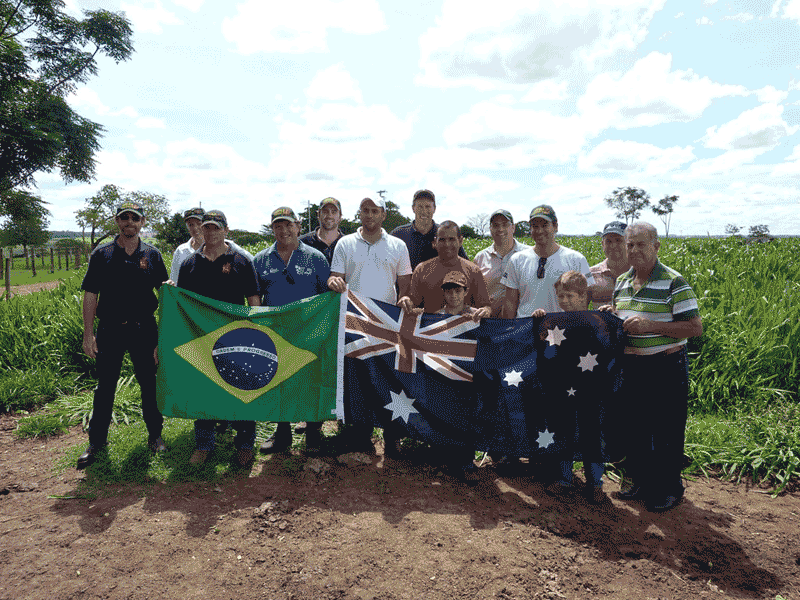Grain research around the world
NUFFIELD SCHOLAR BEGINS TWO YEAR INTERNATIONAL STUDY
touring eight countries on four continents in six weeks may sound like a whirlwind adventure for even the most seasoned traveller but for Crosby Devitt, it’s only the first task as a Nuffield Canada scholarship recipient.

Devitt, Grain Farmers of Ontario’s manager of market development and research, was awarded a 2012 scholarship in January and recently completed the program’s first travel component.
“Visiting farms and farm groups around the world gave me a new perspective on what happens beyond the Canadian border that I can apply to my role in agricultural research,” he says.
With the mission of fostering agricultural leadership through international study, three Canadian Nuffield Farming Scholarships are awarded to individuals each year through a competitive application process. Recipients first participate in a Global Focus Program trip, like the one just completed by Devitt, and then conduct an independent study project to produce a written report and presentation on a chosen agricultural topic.
international lessons
For Devitt the Global Focus Program was an exciting opportunity to learn about agriculture on an international scale. Along with a group of other scholars from Australia, he met with farmers, farm organizations, researchers and government representatives in eight countries. “Even though our trip itinerary was planned, it was less about tours that showcased agriculture and more about discussions and exploring real life issues,” he says.
Australia and New Zealand were the first two countries on the agenda. Both provided excellent learning opportunities with a visit to the Grains Research and Development Corporation, the result of a unique partnership between farmers and the Australian government, being of particular interest to Devitt.
The Netherlands and England then served as host destinations to the Annual Contemporary Scholars Conference where 2012 recipients from all Nuffield participating countries joined together for tours, speakers and discussion.
Following the conference, farms, organizations and government officials were visited in the United States as well as the provinces of Manitoba and Saskatchewan. Devitt and his group also visited Mexico’s Yaqui Valley, home to CIMMYT (The International Wheat and Maize Improvement Center).
Devitt’s highlight and the last location on his itinerary was Brazil. “From small dairy farms mob grazing on fast growing grass to large sugarcane farms operated by foreign investment, visiting different sizes of Brazilian operations gave us a good understanding of agriculture in the country.”
As a farmer himself who grows corn, soybeans, wheat and white beans in partnership with his father and brother near Ripley, Devitt found changes in climate to be the most drastic difference between his destinations and rural Ontario.
Global agriculture’s dependence on irrigation was also a major trend seen throughout the trip. “We saw dairy pastures in New Zealand, vegetable farms in California and an increasing amount of land in Brazil based on irrigation systems,” says Devitt. He predicts that the topic of irrigation will increase in popularity as global discussion about water resource pressure continues.
While irrigation enables growers to harvest two crops annually, he says an advantage to Ontario’s climate that isn’t shared internationally is the positive impact of winter on breaking disease and pest cycles.
future of grain research
Devitt’s independent study project is based on grain research and maximizing productivity growth through partnerships. While his most recent trip provided what Devitt calls a good snapshot of global agriculture, the program’s second component will have a more narrow focus.
“Exploring farming in eight countries gave me an idea of where the best grain research is happening,” says Devitt. “I met some contacts who work in this field and started to have some conversations that I will continue to follow up on.”
Australia, England and France are on Devitt’s list of places to visit before completing his independent study, noting that the most unique part of the Nuffield program is having a global network of experts who are willing to open their door to scholars.
next steps
One of the main objectives of Devitt’s project is to summarize his findings into a report outlining recommendations for farm organizations, research institutions such as universities and government in the area of grain research.
“While the grain industry is big in Ontario, the Ontario grain industry is not big globally,” says Devitt. “There is a lot we can learn from what’s happening around the world with regards to long term research objectives, how research partnerships are modelled and what commercialization opportunities are available.”
Increasing international exposure of the Ontario grain sector and building relationships with research institutions are added benefits of Devitt’s study that have the potential to spur future collaborations.
He cites wheat breeding as an example of upcoming research that could be impacted by his findings. Uncertainty of how the public and private sectors will interact and increasing government constraints are two issues facing future research and by adopting models used internationally, he believes solutions could be found to benefit all parties and maximize research effectiveness.
Devitt also plans to apply what he learns as a Nuffield scholar to his day-to-day activities at Grain Farmers of Ontario. “After an evaluation of global research, Grain Farmers of Ontario can take a leading role in Ontario grain research beyond funding by feeding priorities and providing collaboration contacts around the world,” he says. “Working towards long term research objectives will add value to crops such as corn, wheat and soybeans and benefit farmers in the future.” •























